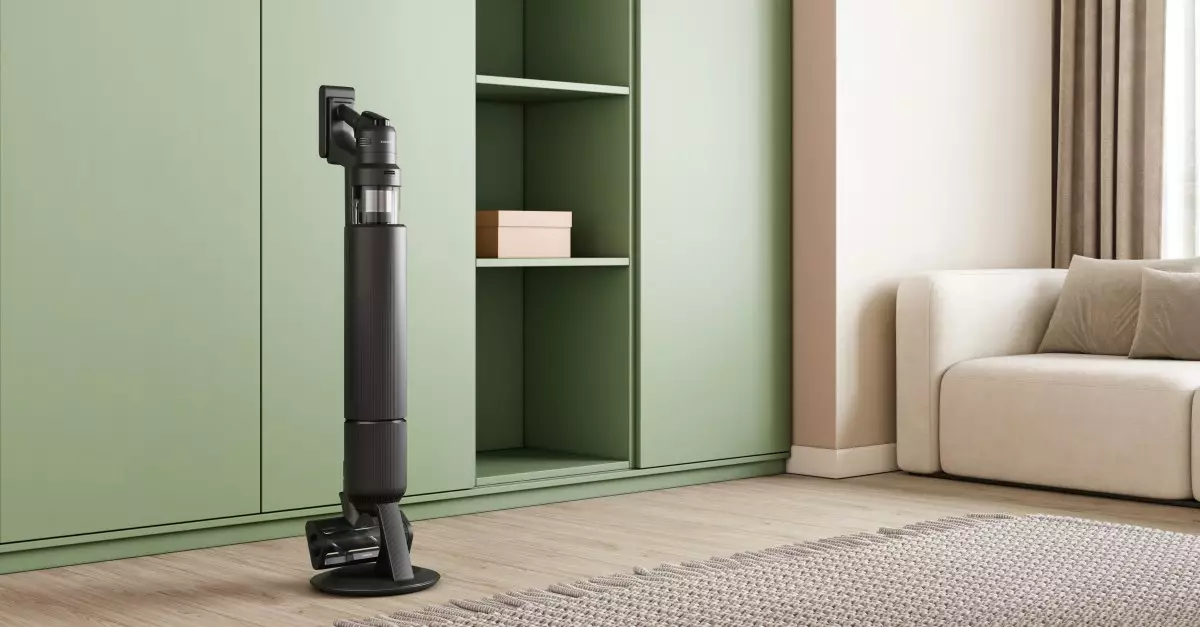In a world where connectivity and automation define our daily lives, it is no surprise that home appliances are evolving at a rapid pace. Samsung, a leader in technology innovation, has introduced a series of exciting advancements in its Bespoke Jet AI line. Aiming to blend functionality with cutting-edge technology, their recent developments are far more than just gimmicks; they signify a substantial shift in how we interact with our home appliances. The latest offerings, equipped with LCD displays and smart functionalities, promise to reduce the friction of daily chores while keeping us connected.
Seamless Connectivity in Unexpected Places
Imagine a vacuum cleaner that doesn’t just clean your floors but also allows you to receive phone calls while you’re at it. The Bespoke Jet Ultra, featuring a robust LCD display, connects seamlessly to your smartphone to notify you of incoming calls and texts. This integration illustrates a fundamental shift — home appliances are no longer isolated; they are becoming integral parts of our connected lifestyles. With a price tag of $1,099, the machine not only excels in suction power with its impressive 400AW but also boasts a battery life that can endure up to 100 minutes, ensuring you can tackle extensive cleaning without interruptions.
The introduction of this feature may be subtle, but it effectively underscores how technology is tailored to address everyday challenges. Traditional vacuuming, often disrupted by mobile notifications, can now be a more streamlined experience, enhancing productivity without compromising communication. Samsung’s consistent push toward connectivity ensures that even the most mundane chores can be executed with fewer distractions.
Expanding Horizons with Smart Laundry Solutions
But the advancements don’t stop at vacuuming. Samsung has ingeniously integrated touchscreens into its washer and dryer combo, the Bespoke AI Laundry Vented Combo. Priced at $3,099, this appliance goes beyond mere functionality; it allows users to answer phone calls on its 7-inch LCD screen, making it a remarkable feature for those who find their smartphones out of reach. Additionally, the automated detergent dispensing system and automatic door opening post-cycle illustrate a focus on practical user needs.
By digitizing the laundry experience, Samsung delivers not just convenience but also a futuristic perspective on household chores. The hands-free capability frees up users from the tension of managing their devices while multitasking, allowing for greater efficiency in an increasingly technology-driven world.
The Integration of AI in Everyday Living
At CES, Samsung introduced the concept of AI Home control panels, showcasing the brand’s vision of a fully connected ecosystem of smart appliances. This idea is pivotal to understanding Samsung’s overarching strategy: to embed artificial intelligence into the fabric of daily life. The ability to connect various appliances with smart home platforms, like SmartThings, elevates the user experience further by centralizing control. For instance, a user could potentially view a recipe on their smart fridge and have the cooking instructions sent directly to their smart oven, all while managing other smart home systems from an interface that seamlessly integrates various functions.
Such integrations highlight another advantage of these new smart appliances — the potential to simplify our lives while adding layers of functionality. Imagine being able to converse with someone at your Ring video doorbell while folding clothes; it’s a blend of utility and luxury that defines modern living.
Concerns Amid Innovation
However, as dazzling as these advancements may appear, they are not without their criticisms. The idea of embedding screens into every appliance raises several legitimate concerns. Critics question the necessity of screens, suggesting that a standalone smart display could achieve similar outcomes at a lower cost and with greater versatility. The durability of touchscreen technology versus traditional knobs in appliances also comes into question, as screens are not immune to malfunction, and, unlike knobs, can often be more fragile.
Moreover, there is an ongoing fear that these screens could serve as platforms for advertising, intruding on the private spaces of our homes. While Samsung has not yet adopted ad-based models for its appliances, the possibility raises concerns about our right to a distraction-free home environment.
Samsung’s push towards an ultra-connected home is exciting and ambitious. However, while innovations enhance functionality, they must also align with user preferences for simplicity and reliability. Balancing advanced technology with practicality is essential to ensure that these appliances truly serve their intended purpose—making our lives easier, rather than complicating them.

